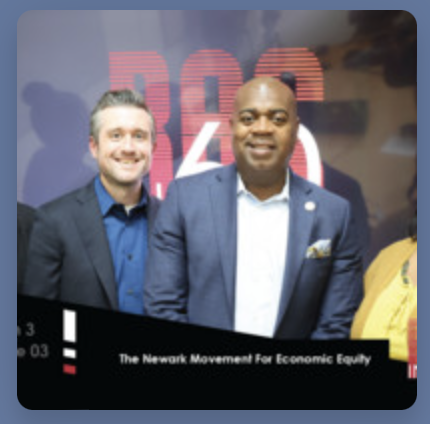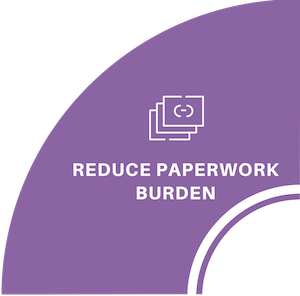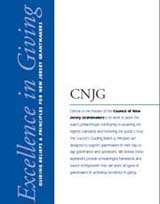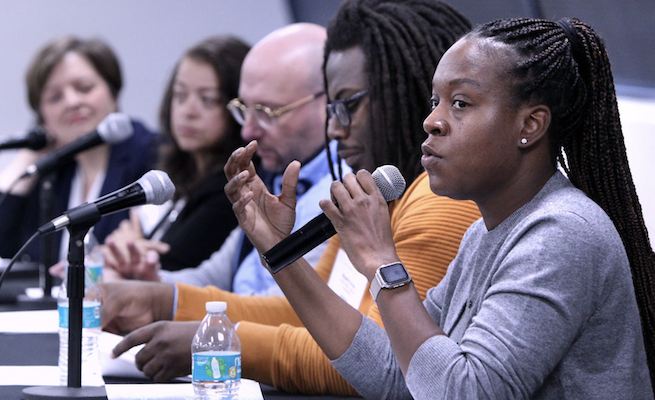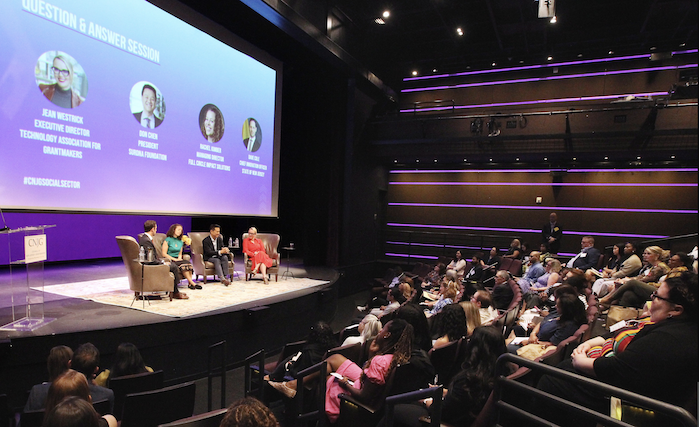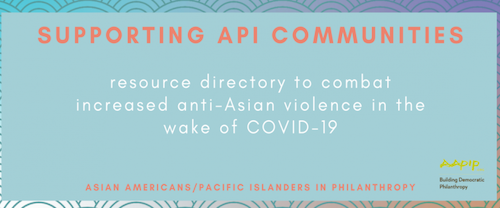Site Search
- resource provided by the Forum Network Knowledgebase.
Search Tip: Search with " " to find exact matches.
With a resounding endorsement, The Westfield Foundation recently voted in three new board members: Toni Janota, Michael Moye and Dr. Cheryl Lundy Swift, all of Westfield. At the same time, the organization recognized the service of outgoing members: Tim Boyle, Stan Gersch and Rich Elbert.
“We express our deepest appreciation for the invaluable contributions of Tim Stan and Rich and their unwavering commitment during their tenure!" said outgoing president Larry Darrow.
Our new board members had the privilege of witnessing our Q2 grants meeting in early May where we funded over $100,000 to community programs. Some notable grants this quarter: providing a new mode of transportation for the Westfield Community Center, renovation funds for The Our House Foundation’s New Providence Day Program site, and continued support for the Presbyterian Church of Westfield’s mission to supplement local in-need families with nutrient-dense food.
Right Size Applications; Simplify Reporting
Affirmation: Paperwork hinders us all.
Duplicative or complex proposal and reporting requirements divert time and resources for both nonprofits and philanthropy, needlessly burdens nonprofit partners and siphons scarce resources away from where they are most needed. Funders can lessen the burden on grantee partners by streamlining the application and reporting processes, especially for repeat grantee partners; decreasing the required data to only the most necessary for decision-making; taking on some of the burden of data collection by gathering data from central repositories such as Candid (formerly GuideStar) and the IRS; and retain and use data already collected from repeat grantees. Funders should require updated information such as annual budget, staffing, board member changes, etc., in their grant applications only when the nonprofit is the only source for this information. Collaborate with other local funders and agree to common GOS application questions and budget templates; streamline tools through technology and offer innovative ways for organizations to apply for and report out on grants; limit written requirements to information that is relevant to the request, and which moves the needle on critical social issues.
Activities
• Reduce rigidity and increase the flexibility of what nonprofits must submit for their applications in creative, egalitarian, and less burdensome ways.
• All funders right-size their application and report requirements relative to the grant amount.
• Shift from reports to conversations or other lower time-intensive means.
• Develop agreed-upon common questions for use across the philanthropy sector for general operating support grant applications.
• Explore the efficacy of using common applications for general operating support grants.
• Change site visits for compliance to goals of learning.
• Consider developing a central data repository for New Jersey nonprofits and funders, where applicants can submit and update basic information once a year, and funders can access the necessary information.
Outcomes
• 75% of funders begin to reduce the size of applications and reports relative to the size of the grant.
• 75% of funders shift from reports to conversations or other lower time-intensive means, like site visits geared to learning and relationship building.
• 50% of funders making general operating support grants accept creative, egalitarian, less burdensome applications including other funders proposals.
• Nonprofits have increased capacity to dedicate time to other activities and efforts.
How to Begin Doing Good Better on Reducing Burden
Learning opportunities
• For funders who do not right-size their applications, what are the barriers to reducing paperwork?
• Who is making the decisions about the application and reporting requirements, and how can they be reached to encourage change? How can we involve more board members of funders in this effort?
• For funders who require reports, determine what is “nice to have” vs. what is needed and used and consider eliminating the rest; what are expeditious ways to collect data including accepting other funders’ reports?
• Which funders who make multi-year grants require a full application for the first year and updates for subsequent years?
Pre-Work
• For funders who already report tailoring their applications, consider how to further simplify processes for grantees; share these practices with other colleagues in philanthropy.
• Learn how information is collected without burdening the applicant.
• Review and implement recommendations already provided by nonprofit networks and philanthropy-serving organizations for concrete examples such as centralized document repositories; allowing nonprofit partners to re-use other proposals and reports; holding check-in meetings in lieu of written reports; and other helpful practices.
• Seek promising practices of funders who use site visits as opportunities to build trust and understand the programs and organizations they support instead of as compliance reviews.
Notes:
See, for example, SMU DataArts (formerly the Cultural Data Project), https://culturaldata.org, a nationwide research and data repository for the arts and cultural community. DataArts serves as a collector and clearinghouse for a wide array of data, which funders can access instead of requiring nonprofits to provide it separately.
The most constant factor in the world today – is change. Sometimes it seems like no matter how well prepared we think we are, unexpected factors keep shifting the road to success, causing roadblocks to constantly pop up to challenge us. And, with the onslaught of what seems like a “natural disaster a week” as well as other emergencies, how does corporate philanthropy respond in a meaningful and timely manner? This session will explore the tools needed to be successful in addressing the needs of our communities as we navigate the changing world. We invite you to join our next virtual meeting of the NJ Corporate Philanthropy Network where Chicago’s Lisa Dietlin, President and CEO of the Institute of Transformational Philanthropy, will provide us with practical tips on how to successfully handle unexpected challenges that seem to face us more regularly in today’s environment.
Cost: Free for CNJG Members; $75 for Non Member Grantmakers
This program is only open to staff and trustees from grantmaking organizations.
New Jersey’s housing, land use, and education policies are at a turning point. Decisions made today will shape how we grow, where we live, and how we prepare the next generation. The Fund for New Jersey and the Princeton School of Public and International Affairs welcome policy experts, community leaders, policymakers, and residents to Princeton University for the fourth and final Crossroads NJ Conversation on these critical issues. The discussion will focus on how today’s challenges can be addressed through thoughtful policy and community-driven action.
FEATURED SPEAKERS
Peggy Bailey, Executive Vice President for Policy and Program Development, Center on Budget and Policy Priorities
Staci Berger, President and CEO, Housing and Community Development Network of New Jersey
Dr. Jesselly De La Cruz, DSW, LCSW, Executive Director, Latino Action Network Foundation
Adam M. Gordon, Esq., Executive Director, Fair Share Housing Center
Robert Kim, Esq., Executive Director, Education Law Center
Cost: This event is free to attend and open to all, but space is limited.
On-site parking is available. Light refreshments will be served.
Excellence in Giving
In 2005, CNJG adopted Guiding Beliefs & Principles to offer a thoughtful source of direction and inspiration to help guide our state’s philanthropic sector into the future. CNJG first launched its Excellence in Giving initiative in 2007 with the goal is to provide grantmakers the practical tools necessary to ensure best practice in their operations and grantmaking.
The first booklet, Guiding Beliefs & Principles for New Jersey Grantmakers includes a wealth of insights and tips related to board governance, legal compliance, grantee communications, fiscal responsibility, public disclosure, and many other key areas of foundation governance and operations. It contains wisdom provided by leaders of all types of giving organizations within the CNJG’s membership, and is intended to serve as a practical resource to assist New Jersey foundations in their grantmaking. CNJG’s board is in the process of updating these beliefs and principles in 2023/2024. For more information on the updating process, please contact Theresa Jacks.
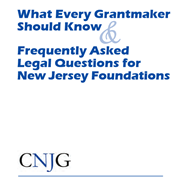 In 2010 CNJG released a second, comprehensive resource to help the state’s philanthropic community understand their ethical, legal, and fiduciary requirements and obligations - What Every Grantmaker Should Know and Frequently Asked Legal Questions. These two booklets are key publications in CNJG’s Excellence In Giving Series. While the Guiding Beliefs & Principles is available publically, members will need to log into access the legal guide for download.
In 2010 CNJG released a second, comprehensive resource to help the state’s philanthropic community understand their ethical, legal, and fiduciary requirements and obligations - What Every Grantmaker Should Know and Frequently Asked Legal Questions. These two booklets are key publications in CNJG’s Excellence In Giving Series. While the Guiding Beliefs & Principles is available publically, members will need to log into access the legal guide for download.
Members can request additional copies of the booklets mentioned on this page by contacting Theresa Jacks.
Inspiring Change through Leadership: Maximizing Philanthropic Impact
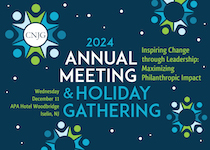 Wednesday, December 11, 2024 - 9:00am to 3:00pm
Wednesday, December 11, 2024 - 9:00am to 3:00pm
Luncheon, Keynote Presentation & Workshop
Location: APA Hotel Woodbridge, 120 Wood Ave S, Iselin, NJ 08830
The Council of New Jersey Grantmakers thanks everyone who attended our 2024 Annual Meeting & Holiday Gathering. On Wednesday, December 11, over 130 Council members and special guests gathered to celebrate the holiday season, welcome new CNJG members, convene our annual business meeting, and feature a dynamic discussion related to the vital work of philanthropy.
The Council’s 2024 Annual Meeting & Holiday Gathering was the place where CNJG members and New Jersey’s philanthropic community came together to share ideas about the important work they’re doing. It also provided a valuable opportunity to connect with colleagues.
This year’s theme, Inspiring Change through Leadership: Maximizing Philanthropic Impact, featured keynote speaker Amalia Brindis Delgado of the Panta Rhea Foundation.
The Annual Meeting included a workshop that explored the New Jersey Principles for Philanthropy. An overview of the Principles was presented, followed by a panel of fellow CNJG members who discussed how they are already using the Principles within their organizations. Attendees also had time to discuss how they could leverage the New Jersey Principles for Philanthropy to make changes within their own organizations.
Annual Meeting Photos
Empowering the Future: Harnessing AI and Data for Philanthropic Social Impact
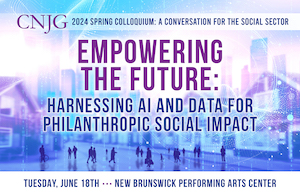
Date: Tuesday, June 18
Time: 9:30 a.m. to 3:30 p.m.
Location
New Brunswick Performing Arts Center
Arthur Laurents Theater
11 Livingston Ave, New Brunswick, NJ 08901
Directions and Parking
On Tuesday, June 18, 2024, the Council of New Jersey Grantmakers held the Spring Colloquium – A Conversation on the Social Sector at the New Brunswick Performing Arts center. This year, we explored the impact of AI and data on philanthropy and the nonprofit sector. Our panel discussion will brought together multiple perspectives to explore how AI can enhance problem-solving without losing human connections, how it affects equity, and how philanthropy has engaged with AI for funding initiatives.
The Technology Association of Grantmakers’ new Executive Director, Jean Westrick, moderated our esteemed panel that included Don Chen, President, Surdna Foundation; Rachel Kimber, Full Circle Solutions; and Dave Cole, State pf New Jersey’s Chief Innovation Officer.
After the panel, Jean Westrick, TAG, facilitated an afternoon session on an AI Framework for Philanthropy. Additionally, the Community Resource Exchange presented an afternoon session on an AI Guide for Nonprofits facilitated by their CEO, Tiloma Jayasinghe, CEO and Jared Carroll, Senior Consultant.
CNJG’s spring colloquium brought together New Jersey grantmakers and nonprofits to connect with each other, Increase their knowledge, learn best practices, find opportunities for collaboration, and to be introduced to new ideas.
Conference Photos
Impact Investing Bootcamp: Fundamentals for Driving Sustainable Philanthropy in New Jersey is a 3-part series introducing CNJG members to impact investing. The series will take place from March to May 2024.
The Council on Foundation defines impact investing as “any investment activity that intends to generate positive social and financial returns. Whether called impact investing, mission investing, social investing, social-impact investing, mission-related investing, program-related investing, or sustainable and responsible investing, the practice focuses on activating new financial resources to solve social and environmental problems.”
Impact investing as a tool can generate positive, measurable social and environmental impact alongside financial returns. By attending this series you will:
- Learn the fundamentals of how to create a more sustainable model of philanthropy through impact investing tools.
- Hear from experienced practitioners.
- Learn how to successfully integrate grantmaking and investment resources.
- Participate in interactive discussions with local peers.
- Hear examples of investments made in New Jersey and nationally.
- Attend a site visit to see impact investing in action.
- Receive a copy of the book “Impact Investing: The Practical Guide” by John Duong.
Session 2: This session will feature a site visit to Hinchliffe Stadium to highlight the project and explore local case studies of NJ foundations implementing impact investment strategies. Grantmakers will have the opportunity to tour the project site, hear from nonprofit partners and participants, ask questions, and learn directly from those involved.
COST: Free for CNJG Members
Registrants must attend all three sessions of the series.
Space Limited. No more than two people per organization can register.
Additional Session Information:
Tuesday, March 12, 2024, 9:00 am – 4:30 pm - Session 1: In this full day workshop John Duong, founder and CEO of Kind Capital, will lead a dynamic and intensely focused full day of learning, knowledge-building, and exchange. The curriculum will include baseline information, the fundamentals of impact investment, methods and models, and opportunities for peer to peer and small group discussion and dialogue. A light breakfast and lunch is included.
Thursday, May 16, Time TBD - Session 3: This virtual session will focus on setting the groundwork for New Jersey philanthropy to explore additional shared learning and co-investment opportunities. The discussion will be led by John Duong, Kind Capital.
Speaker:
Mr. Duong has been an investment banker at JP Morgan Chase, was founding Managing Director of Lumina Impact Ventures with Luminia, and was Program and Portfolio Officer with the W. K. Kellogg Foundation. John holds an executive MBA with a concentration in management and entrepreneurship from the Kellogg School of Management.
This CNJG program is sponsored by: Robert Wood Johnson Foundation and Victoria Foundation and presented by Kind Capital.
Resources
The Impact Principles website
Planet Tracker website - Reports for climate focused investors
Catalyzing Finance for Racial Equity
RPA Impact Investing Handbook
Impact Investing: A Primer for Family Foundaitons
What Can Foundations Do to Foster Community Investment?
The Role of Impact Capital in Advancing Racial Equity
Impact Capital for Racial Equity: Investing with Intention and Measuring Impact
Emerging Sources of Community Investment Capital and Strategies to Direct it at Scale
Mapping the Journey to Impact Investing
Roadmap for the Future of Impact Investing: Reshaping Financial Markets
Community Foundation Field Guide to Impact Investing
Essentials of Impact Investing
Endowments & Investing
Place-Based Impact Investing: Three Briefs for Practitioners
Responding Post Sandy: Philanthropic Relief & Recovery
Superstorm Sandy officially came ashore in New Jersey on October 29, 2012 at 8:00 p.m. and its aftermath continues to be felt in communities throughout our state. Not 24 hours after the storm made landfall, CNJG began planning a series of actions to help inform funders what to be prepared for, share information and discuss strategies. CNJG's support of the philanthropic community as it navigates the shifting landscape of disaster recovery, continues.
CNJG has been working closely with their philanthropic members in New Jersey and their philanthropic colleagues from around the nation who have experience in disaster philanthropy, as well as working cooperatively with the Governor’s Office on Recovery, FEMA, NJ State Police Office of Emergency Management, NJ Voluntary Organizations Active in Disaster, NJ’s Long Term Recovery Group Leaders, and NJ’s leading nonprofit organizations.
Post Sandy Funder Briefings
Beginning one week after Sandy struck New Jersey CNJG launched a weekly conference call series for grantmakers to hear from policymakers, disaster relief/recovery experts and colleagues who have been through similar catastrophes. Grantmakers heard from nearly 70 guest speakers including policymakers, disaster relief and recovery experts, and statewide and national foundation leaders that have experienced similar catastrophes. The briefings provided an opportunity to connect directly with local leaders and state officials addressing the many needs of our communities. Grantmakers learned about issues related to both disasters in general and Sandy recovery in particular. Topics included housing, mental health, social justice, universal design, FEMA’s National Disaster Recovery Framework, and an array of environmental issues. All of the calls were recorded and also transcribed into concise written summaries and are available on our website.
Series 1 ran from November 2012 -- March 2013
Series 1 Audio Recordings
Series 1 Written Summaries
Series 2 ran from September 2013 -- November 2013
Series 2 Audio Recordings
Series 2 Written Summaries
Series 1 & 2 Written Compendium
Funders’ Briefing Post Sandy Recovery at 18 months
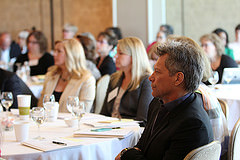 With support from the Jon Bon Jovi Soul Foundation and OceanFirst Foundation, CNJG presented a specific briefing on housing, hunger and mental health recovery efforts and needs 18 months after the storm. We heard personal stories from families that were displaced and their long struggle to rebuild and recoup. We heard insights from service providers on the long term effects of Sandy. Several Long Term Recovery Groups described some of their ongoing challenges, but also shared what was working.
With support from the Jon Bon Jovi Soul Foundation and OceanFirst Foundation, CNJG presented a specific briefing on housing, hunger and mental health recovery efforts and needs 18 months after the storm. We heard personal stories from families that were displaced and their long struggle to rebuild and recoup. We heard insights from service providers on the long term effects of Sandy. Several Long Term Recovery Groups described some of their ongoing challenges, but also shared what was working.
CNJG’s response to Superstorm Sandy also included
Coastal Communities Site Visit Tours
CNJG offered its members a rare opportunity to tour several of the disaster-affected communities in Monmouth and Ocean Counties and to hear from those on-the-ground. Throughout the day, twelve guest speakers representing all areas of the effort, including individuals from FEMA, local and state government, Long Term Recovery Group leaders, city and state planners, environmental professionals, social services personnel, and faith-based leaders, among others spoke to a group of 60 philanthropic leaders. Building upon the first successful Coastal Communities Site Visit Tour, CNJG offered a similar program focusing on communities in northern New Jersey – specifically the hard hit areas in Essex, Hudson and Bergen Counties. In addition to hearing from a wide range of local officials, Long Term Recovery Group Leaders, urban planners, and environmental experts, the site visit included a tour of a PSEG sub-power station which was flooded.
Statewide Conference
Bringing together an incredible community of funders, providers and practitioners for a day of exploration, shared learning and discussion at the Spring 2013 Conference for the Social Sector - Our Shared Road Ahead: Sandy and Beyond on June 10. The Conference provided participants with an important opportunity to hear about the lessons learned by social sector colleagues and experts around the country who have grappled with how to create effective long-term philanthropic responses to catastrophic events in the absence of a readily available guide.
Superstorm Sandy Philanthropic Investments Scan
Philanthropy & Hurricane Sandy: A Report on the Foundation & Corporate Response is a report released in October 2014 by CNJG and partners that examines the response of foundations, corporations, and other institutional donors to the devastation wrought by Hurricane Sandy in October 2012. Numbering nearly 600, these funders have so far committed more than $380 million for relief, recovery and building efforts. The hard data and reflective observations in the report contribute to the growing body of knowledge that helps foundations and corporations be strategic and effective with their giving when disaster strikes.
Two years after the historic storm, this report breaks down the allocation of dollars contributed thus far and offers perspective on the role of private giving in disaster response and lessons to be taken from this one. The report was published by the Foundation Center in partnership with the Council of New Jersey Grantmakers and Philanthropy New York, and with support from the Center for Disaster Philanthropy.
Special thanks to our philanthropic partners that have supported various aspects of the Council’s work beginning immediately after Hurricane Sandy struck through our ongoing work today, including: the Center for Disaster Philanthropy, Citi, Fund for New Jersey, The Henry & Marilyn Taub Foundation, The Horizon Foundation for New Jersey, Hurricane Sandy New Jersey Relief Fund, JCP&L, JPMorgan Chase, Jon Bon Jovi Soul Foundation, The Merck Company Foundation/Merck & Company, Inc., PSEG Foundation, Provident Bank Foundation, Rita Allen Foundation, Subaru, TD Bank, United Way of Essex and West Hudson, Verizon NJ, and the Victoria Foundation.
Thank you to everyone who attended CNJG’s 2019 Annual Meeting and Holiday Luncheon.
The theme for the 2019 Annual Meeting and Holiday Luncheon was “Challenging Power Dynamics to Build Strong Partnerships,” and focused on how philanthropy can forge more transparent, trusting, and dynamic relationships with nonprofits and the communities they serve.
The pre-meeting workshop, “Finding Balance: Addressing Grantmaker-Grantee Power Dynamics Head-On” was led by Linda Czipo of the Center for Non-Profits and Tim Delaney of the National Council of Nonprofits. The workshop explored ways in which funders could overcome power dynamics. Tim and Linda discussed strategies to create more powerful partnerships, such as multi-year funding, advocacy, and unrestricted general operating support, and shared hero and horror stories to remember when working with nonprofits.
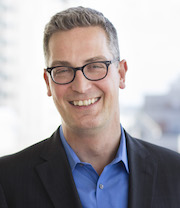 To close out our event, Phil Buchanan, President of the Center for Effective Philanthropy gave a captivating keynote address entitled “Giving Done Right: The Challenge and Opportunity.” During his presentation, Phil discussed the current critique of philanthropy, reminded us of the importance of working with and reflecting the communities we serve, and left attendees with seven different ways in which we can work more effectively with our partners in the new year.
To close out our event, Phil Buchanan, President of the Center for Effective Philanthropy gave a captivating keynote address entitled “Giving Done Right: The Challenge and Opportunity.” During his presentation, Phil discussed the current critique of philanthropy, reminded us of the importance of working with and reflecting the communities we serve, and left attendees with seven different ways in which we can work more effectively with our partners in the new year.
Together, the social sector has the power, resources, and know-how to respond to our communities’ urgent and long-term needs. Thank you for joining us for this year’s critical conversation on breaking down power dynamics and building strong partnerships.
AGENDA
10:00 am to 11:30 am Pre-Meeting Workshop
11:30 am to 12:00 pm Networking and Registration
12:00 pm to 2:30 pm Luncheon and Business Meeting
Pre-Meeting Workshop: “Finding Balance: Addressing Grantmaker-Grantee Power Dynamics Head-on"
Presenters: Linda Czipo, President & CEO, Center for Non-Profits and Tim Delaney, President and CEO, National Council of Nonprofits
Linda Czipo, President & CEO of the Center for Non-Profits, and Tim Delaney, President and CEO of the National Council of Nonprofits, will present this year’s workshop on how to overcome power dynamics between funders and nonprofits. This workshop will explore ways in which funders can create trusting and transparent relationships with grantees, and further engage nonprofits in their grantmaking strategies. Among other things, we will explore strategies to incorporate full cost funding that strengthens the effectiveness of your grantees' work. Join us for a discussion on how philanthropy can move towards a system of truly partnering with nonprofits in order to maximize the beneficial impact for your community.
The Council thanks our generous event sponsors: Novartis - Signature Sponsor, The Prudential Foundation – Sustaining Sponsor, New Jersey Health Initiatives – Speaker Sponsor, Princeton Area Community Foundation – Gift Sponsor, Devils Care Foundation and Sixers Youth Foundation – Pre-Meeting Workshop Sponsors, Novo Nordisk – Program Sponsor, The Provident Bank Foundation – Performance Sponsor, Blue Cross Blue Shield of New Jersey – Contributing Sponsor, and The Jay and Linda Grunin Foundation – Supporting Sponsor. Additional support provided by NJM Insurance Group.
Annual Meeting Photos
Watch Everyone Deserves a Fair Slice from the Human Services Council.
In response to the murders of George Floyd, Breonna Taylor, Tony McDade, Ahmaud Arbery, and countless other Black individuals, we have seen a call to end systemic racism, police brutality, and injustice. To explore philanthropy's role in fighting against racism and injustice, CNJG is sharing information about upcoming programs that we and our Philanthropy-Serving Organizations are presenting and other resources below. While some programs or resources have been organized in direct response to recent protests and calls for action, all are part of a longer conversation on racism in our country and within our sector. As CNJG weaves equity into all of our work, we look forward to continuing these conversations with you.
We realize this is not a comprehensive list, and we are posting items that CNJG staff sees, which is not nearly enough. We ask that our members, especially those who are black and brown, to help us find articles written by, resources created by, and programs led by people of color. Share those resources by emailing us. This page is just a part of our work in equity. We created this page as one starting point for New Jersey’s philanthropic community to engage in conversations, do background reading, attend programs, learn, and take action.
For those members interested in continuing the conversations, we invite you to join our Racial Equity listserve, by emailing Craig Weinrich. On that listserve, members can share information, resources, and opportunities that are helpful to the funding community.
Visit these Websites
Asian Americans/Pacific Islanders in Philanthropy (AAPIP) Resource Directory
This Supporting API Communities Resource Directory was developed to mobilize the philanthropic sector towards meaningful action in the midst of heightened violence and hate targeting Asian American communities.
Participatory Grantmaking
A curated list of resources and articles from Candid on the movement of participatory grantmaking that engages the community in the grantmaking process.
The Power of Asset Framing: A Conversation with Trabian Shorters
This blog post by the Skillman Foundation contains a series of short videos by Trabian Shorters, founder and CEO of BMe Community, who describes shifts in narrative that all philanthropy should consider.
Putting Racism on the Table
This site created by the Washington Regional Association of Grantmakers is the inspiration for CNJG’s Race, Racism and the Ramifications for Philanthropy Series.
Race to Lead Series
A site with reports and surveys on the racial leadership gap in the nonprofit sector.
Stanford Social Innovation Review
The Struggle to Overcome Racism, a list of resources to help leaders of social change and activists.
Trust-Based Philanthropy Project
A peer-to-peer learning and advocacy initiative to make philanthropy more based on trust.
United Philanthropy Forum is committed to advancing racial equity in philanthropy. We provide space for our members to connect, learn and share together on how to effectively address racial equity in their work as philanthropy-serving organizations (PSOs), and works to share our members’ learnings with the broader philanthropy field. As part of these efforts, we are pleased to share case stories from our members about their racial equity work.
Case Story
Funders Together to End Homelessness: A Racial Equity Learning Journey
Funders Together to End Homelessness began its racial equity journey in 2016. Its case story explains how the PSO named racial equity in its strategic plan and embarked on a learning journey together with its board, staff, and members to normalize the conversation about structural and historic racism and how it contributes to disparities in the homelessness system. The story also describes how Funders Together created a two-year community of practice, called Foundations for Racial Equity (FRE), that has been a critical part of its journey, and how its codified its racial equity work through the creation of its Commitment to Racial Equity.
Read Funders Together’s Case Story
Listen to Funders Together’s CEO Amanda Misiko Andere talk about her organization’s racial equity journey on an episode of the ForumNation podcast.
Case Story
Southeastern Council of Foundations: An Experiential Racial Equity Journey
In early 2018, the Southeastern Council of Foundations (SECF) along with its board undertook a racial equity learning journey in order to develop an Equity Framework that would describe and define SECF’s character, what it stood for, and what its leaders were willing to fight for. The decision to develop the Equity Framework was the culmination of years of work. SECF’s case story explains how the organization used data to inform the development of its Equity Framework, created an Equity Task Force to lead the effort of developing a Framework, and engaged board, staff and Task Force members in a racial equity learning journey.
Listen to SECF’s President & CEO Janine talk about her organization’s racial equity journey on an episode of the ForumNation podcast.
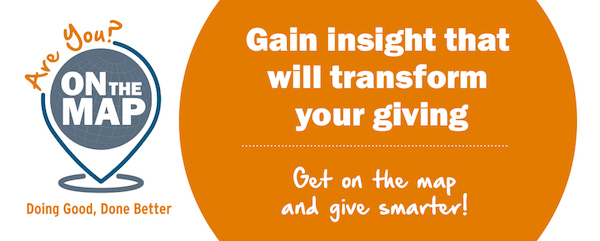
Get on the map and give smarter
Get on the Map is an exciting data-sharing initiative designed to dramatically improve the quality and availability of giving data for our region. Using this tool to put your grantmaking in context will provide valuable insights that can transform your giving.
Knowing how other foundations or corporations are funding in a certain geographic area or with a specific nonprofit can make everyone’s work more effective.
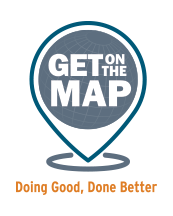 Imagine real-time answers to questions like:
Imagine real-time answers to questions like:
- How are others serving at-risk youth?
- Are organizations in our region receiving enough capacity building support?
- Who else funds economic development in our rural communities?
Through a partnership with Candid (formerly the Foundation Center) and the United Philanthropy Forum, Get on the Map enables CNJG members to see the scope of their grantmaking, find natural funding partners, and gain deeper understanding of New Jersey’s philanthropic landscape.
Watch the short video below to learn how easy it is to Get on the Map!
It starts with sharing your giving data
Your data will power valuable resources for your organization and our region, including access to the CNJG Foundation Funding Map, a special interactive searchable mapping platform, engineered by Candid.
When you share your data, you control your story. No one knows your grantmaking better than you. Tell your story, your way is good for the sector because better information benefits everyone. Join the community of funders sharing their data to ensure the field is acting on the best possible information. Share Now!
Self-Paced Training for Funders on Using Candid
Candid has also launched a new, free self-paced course for funders: Funding Smarter: Using Candid Tools to Inform and Share Your Foundation’s Work. The course is meant to help funders use Candid’s mapping, data, and knowledge tools to better identify funding peers, potential grantee partners, identify funding connections and gaps, and learn from knowledge other funders have already shared. It also highlights the value of sharing data with Candid.
We are pleased to share Strengthening Philanthropy in Newark - Report to the Field 2015 from the Office of the Newark Philanthropic Liaison. First established in 2007, the Liaison office represents one of the nation’s first formal partnerships between a city and the philanthropic community. The initiative began as a partnership between the Council of New Jersey Grantmakers in collaboration with then Mayor Cory A. Booker. We are proud this unique partnership continues with Mayor Ras Baraka and his new administration.
This report provides a brief summary of some of the substantial activities and impact the Office of the Newark Philanthropic Liaison facilitated throughout 2015. The strategy of collective impact is thriving throughout Newark thanks in large part to the work of the Liaison, and the funding community’s support of and robust engagement with the Office of the Mayor and anchor institutions across the city continue to reap positive outcomes. The Office of the Newark Philanthropic Liaison is supported by: Bank of America, The Foundation for Newark’s Future, Geraldine R. Dodge Foundation, The MCJ Amelior Foundation, The Nicholson Foundation, Panasonic Corporation of North America, The Prudential Foundation, Schumann Foundation for New Jersey, Turrell Fund, Victoria Foundation, and PSEG Foundation providing in-kind support and meeting space.
The Fund for Women and Girls of the Princeton Area Community Foundation has awarded a record $325,000 in grants to local nonprofit organizations.
This funding is the largest amount awarded in any cycle of the Fund’s more than 20-year history and includes a first-time award for the Liz Gray Erickson Memorial Grant, a 3-year grant given in memory of the Princeton resident who served as the chair of the Fund from 2012 to 2014.
“Thanks to the generosity and commitment of our Fund for Women and Girls members, we’ve awarded more than $1 million in grants to more than three dozen nonprofits in the last five years,” said Jenifer Morack, Fund Co-Chair.
Fund members pool their donations, then recommend grants to be awarded annually to local nonprofits. Isabel Zisk, Fund Co-Chair, said making a gift to the Fund is incredibly effective. Individual donations create a leveraged pool of funding that greatly benefits nonprofits working to impact the well-being of women, girls and communities in our region.
“We do what no individual donor has the expertise, time or access to do,” she said, explaining that the Fund’s Grants Committee members read dozens of applications and conduct site visits with nonprofits. “Because of some very generous gifts, this year, we have the honor of awarding the Liz Gray Erickson Memorial Grant. With her visionary leadership, Liz planted the seeds of our grantmaking focus.”
More than 20 years ago, the Garden State’s philanthropic community began meeting informally to discuss issues of importance to grantmakers. In the late 1980s, fueled by the observation that philanthropy is more effective when grantmakers have a forum to communicate, exchange information, and take part in continuing education, CNJG was born.
By 1998, CNJG was an independent 501(c)(3) organization with a full-time executive director and approximately 80 members. In the years since, membership has grown to include more than 130 foundations, corporate giving programs, government and other public grantmaking organizations. Informal gatherings of likeminded individuals and organizations have been replaced by robust, highly valued seminars, convenings, workshops and conferences.
Extending Philanthropy's Contribution
Over the years, CNJG also actively engaged in a number of landmark initiatives including commissioning the first study of giving in the Garden State, NJ Gives, the first study of nonprofit health insurance provider conversions to for profit corporations, New Jersey Together (a major funder collaborative centered on youth development), a landmark effort looking at the systemic, long term fiscal challenges facing all levels of government in New Jersey entitled Facing Our Future, the creation of the Community Foundation of South Jersey, and creation of the Newark Philanthropic Liaison position within our state’s largest city administration.
View our CNJG Through the Years pictorial.

